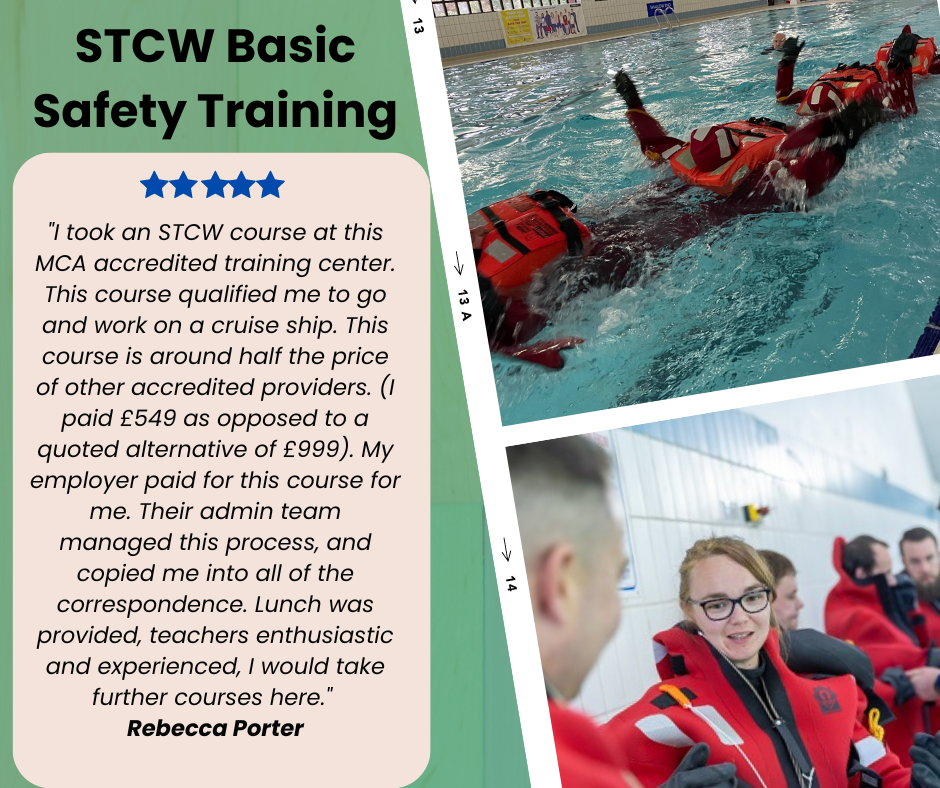How much can I earn working on a yacht?
It is important to remember this is an estimate, and salaries and earnings differ vastly, with those with more experience and in more senior positions commanding higher wages.
Is working on a yacht dangerous?
As with any maritime role, yacht work can indeed carry certain risks due to the dynamic and unpredictable nature of the sea. However, with the proper training and adherence to safety protocols the risks can be significantly mitigated.
This is why having the right training is so important to getting a job on a yacht.
What training do I need to get a job on a yacht?
STCW Basic Safety training is a requirement for anyone who wants to work on a commercial ship – whether that be a cruise ship or a large yacht.
The STCW Basic Safety training course is 5 days and comprises of theoretical and practical components. Participants learn about safety procedures, firefighting techniques, and life-saving equipment usage. Hands-on training ensures that those who complete the course are well-prepared to handle emergencies onboard a water vessel.
After completing the STCW courses you will be equipped with the essential skills you need to handle emergencies, operate safety equipment and navigating challenging situations you may face whilst working on a yacht. These certifications are not only a requirement – but also shows your commitment to safety and professionalism to potential employers.

How do I apply for a job on a yacht?
If you want to apply for a role on a yacht – we recommend you follow these 7 steps:
- Show passion and dedication
Working on a yacht is not easy! Those who apply for roles should have a genuine passion for maritime life. Working on a yacht involves long hours, diverse tasks and close quarters living.
- Research Yachting Roles
There are many different roles on a yacht. Before you apply, research the different positions – and what each job role involves. Research the responsibilities of each roles, the skills require and the average daily routines. This will ensure you pick the right role for you – and will show potential employers you understand what will be expected of you.
- Have the Right Training and Qualifications
A formal education might not be mandatory – but relevant qualifications can help boost your chances of obtaining a position. Nautical degrees, hospitality training and required certifications (such as STCW training) will enhance your employability.
- Network
Building connections within the yachting community is invaluable. Attend industry events, join online forums, and engage with professionals to uncover job opportunities.
- Prepare Your CV
Tailor your CV for the yachting industry. Make sure you showcase relevant skills, experience and qualifications – as well as highlighting your skills related to teamwork, adaptability and customer service.
- Show Your Flexibility and Adaptability
Yachting life is ever-changing. Prospective employers value candidates who can adapt to new environments, cultures, and challenges. When interviewing, make sure you show potential employers that your adaptable and flexible to changing needs and environments.
- Physical Fitness
Yacht work can be physically demanding! Maintaining good health and fitness is crucial to handle the rigors of the job.

How & Where to Apply for Yachting Jobs
There are many different ways to apply for yachting roles in the UK and abroad. If you wish to find roles in person – then you will need to visit yacht marinas and network with boat owners and tour operators. If you wish to work abroad, you may be required to arrange visas to work aboard commercial boats.
If you wish to apply for roles online – there are many different networks and websites which allow you browse and apply for roles online by submitting your CV. It is worth noting that yachting jobs tend to be seasonal, depending on location. Roles are often temporary and those that work on yachts tend to move from vessel to vessel.
Websites worth checking for roles include Yacht Jobs and The Crew Network.





